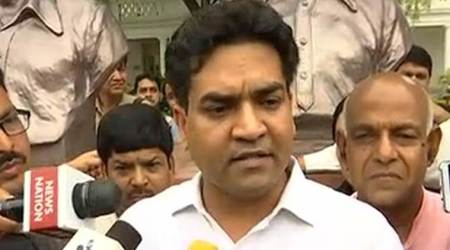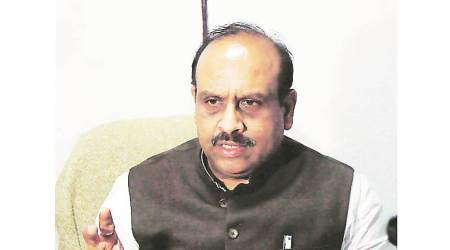 The debate comes at a time when a number of cases are being examined by these House committees, ranging from irregularities in the CNG-fitness case to the more recent alleged irregularities in the DJB. (File Photo)
The debate comes at a time when a number of cases are being examined by these House committees, ranging from irregularities in the CNG-fitness case to the more recent alleged irregularities in the DJB. (File Photo)
“Nowhere has it been decided that the Lieutenant Governor is above the House,” said AAP MLA Saurabh Bhardwaj during a debate on the role played by House committees — an issue that threatens to be the new flashpoint between the Centre and the state. On Tuesday, the proceedings ended with Speaker Ram Niwas Goel referring to Leader of Opposition Vijender Gupta’s claim that the committees were “unconstitutional” to the Privileges Committee. The debate comes at a time when a number of cases are being examined by these House committees, ranging from irregularities in the CNG-fitness case to the more recent alleged irregularities in the DJB. On June 2, Vijender Gupta wrote to Delhi L-G Anil Baijal, and in a statement to the press, cited his letter saying: “These committees have been illegally constituted… primarily to settle score with senior… officers” who were “being made to fall in line through humiliation, grilling and questioning in the House panels”.
Earlier, the Additional Solicitor General had reportedly recommended — after the Home ministry and the Delhi L-G sought his legal opinion — that these committees were trying to “usurp” executive or judicial functioning. Goel’s statement to the press was referred to the Privileges Committee. Meanwhile, Deputy CM Manish Sisodia argued that the fact that Gupta, a “member of the House”, was arguing for a “reduction in powers of the House”, hinted at a “conspiracy”. He said, “This is perhaps the first House in the country where its members are asking for their powers to be reduced”.
He added that the attempt to “decentralise power” was being thwarted by the BJP because the party “didn’t believe in democracy” and was trying to “undermine democratic institutions”. By the time the session ended on Tuesday, neither the government nor the Speaker’s office had received any formal intimation from the L-G’s office, confirmed sources. Gupta told The Indian Express: “The role of the executive and the legislative is clearly defined. The ASG, in his report to the L-G, has explained what the law states. What the government is trying to do right now, is to side track the opposition so that they can continue on this illegal and unauthorised path.”
Constitution expert Subhash Kashyap said, “In case of Delhi, Parliament has the overriding power to pass law in regard to any matter. Delhi Assembly can pass bills in regard to certain matters but they are subject to approval of the L-G. Unless L-G signs them, they do not become law and
L-G may send it to the union government for their acceptance. We cannot look at the powers of Delhi Assembly in context to the powers of other state assemblies… This also depends on the matter being discussed…”






